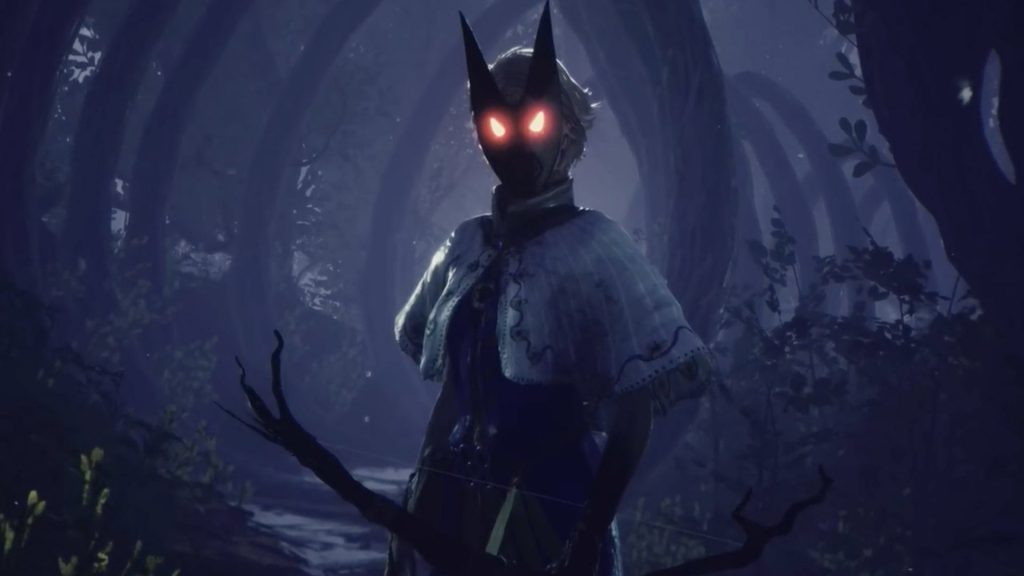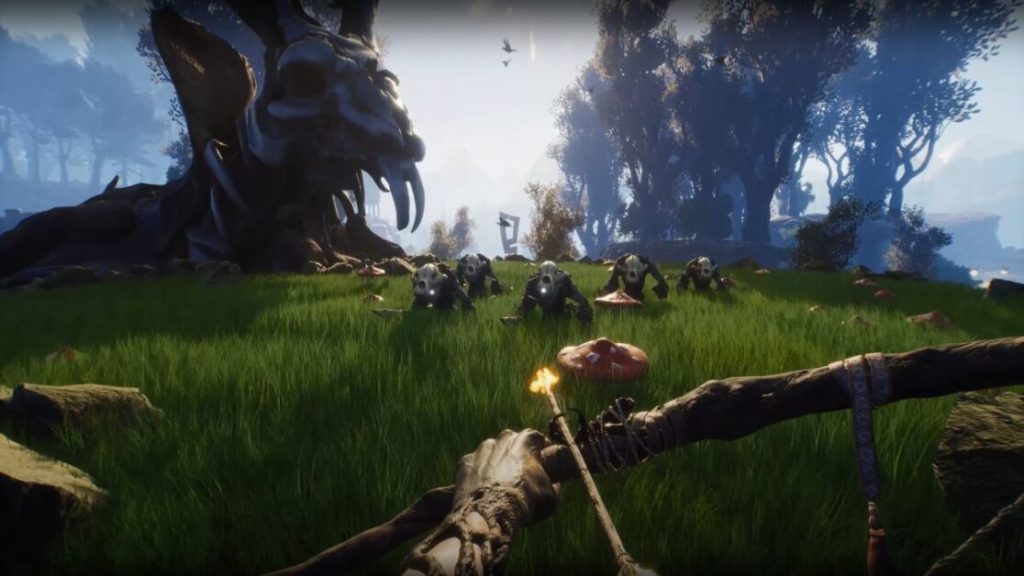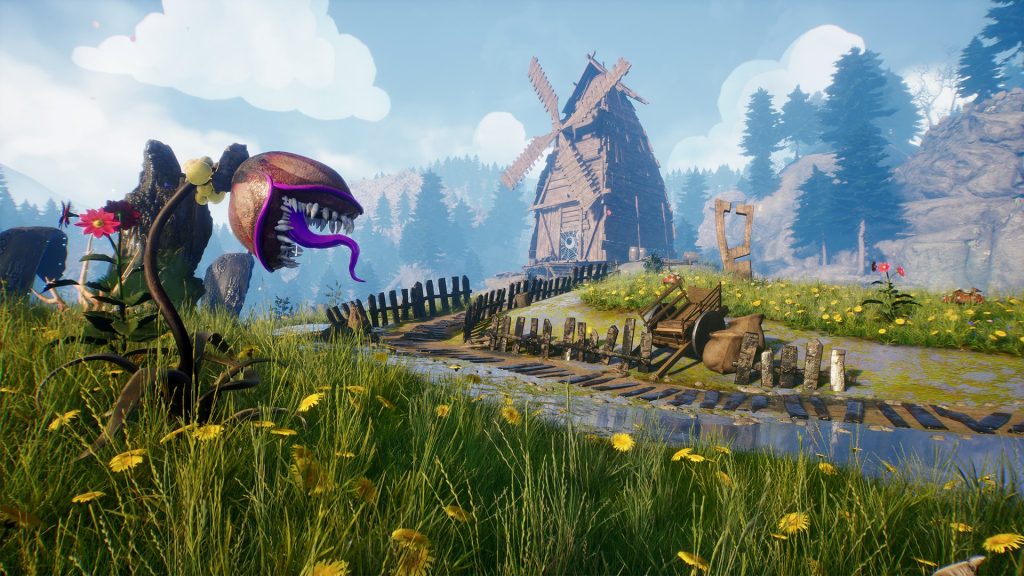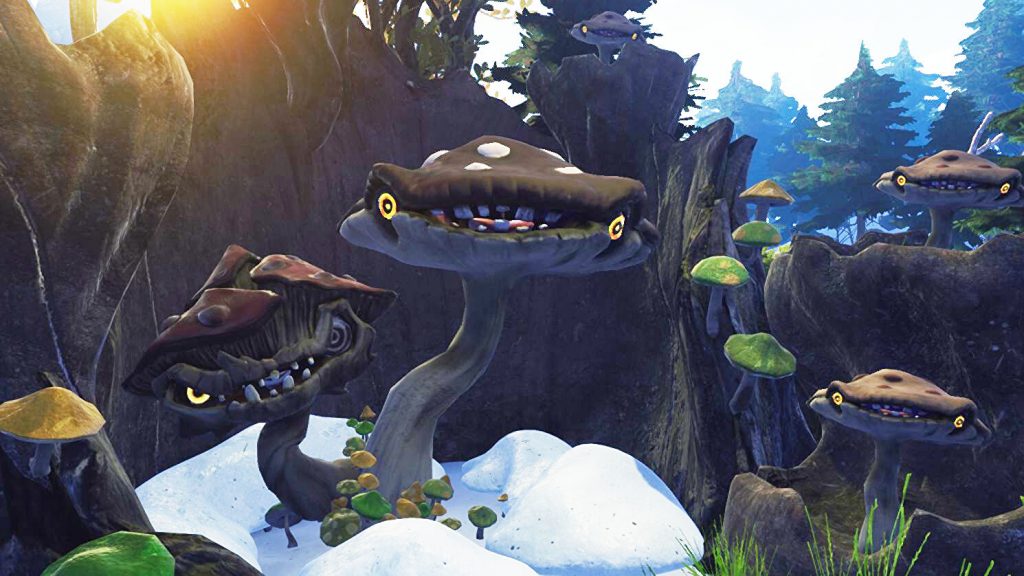Blacktail is a hidden gem Focus Entertainment decided to stealth release last month. I didn’t hear much about it—never even knew it existed—until it randomly popped up on my PlayStation Store recommendations…I’m sure glad it did.
Blacktail is made by an indie studio named The Parasight, which follows the mythical tale of Baba Yaga. To get a little backstory on this, Baba Yaga basically tells the story of a witch who lives in the forest and, depending on your intentions, could lead to a good or bad experience.
The game takes this factor into account from the very beginning, and it designs your whole experience based on the choices made. Right away you are basically asked what your intentions are before heading off on the adventure: will you be on the light or dark side? Upon picking, you dive into this twisted fairy tale that gets better and better as you move along, while the choices keep piling up. There are choices to be made with characters you interact with on your journey. You can choose to assist them, tell them the truth, or lie to them. Some choices are very obviously good or bad, while others have you questioning what exactly you should say or do.

What I found neat is how the world around you also influences good and bad decision making. For example, you need honey to craft sticky arrows, so the obvious thing to do is to look up and shoot down bee’s nests to gather it. By doing so, however, you gain a bit of negative karma (plus the bee’s will attack you). Instead there are offerings near many of the bee’s to gather honey, or you can attack certain enemies which will drop it as well. There are a few instances I’ve come across where my actions led to some karma swinging one way or another.
Upon meeting two talking mushrooms, Borvy and Borko, we start to see the story really progress. The two mushrooms seem like they have a light and a dark side to them, and both want to influence your decisions moving forward. You can choose to listen to either one, or adventure off on your own. What is interesting is that based on how you move forward from here is where things start to get interesting because things are not all as they seem. Without spoiling much, you learn that some good characters are actually up to some mischievous things and either directly or indirectly causing problems.
The entire story is narrated by your inner voices, one being Yaga herself (the character you play) and an inner voice with no name. The inner voice is oftentimes questioning your decisions, or trying to influence you in some way. The pushing and pulling between the two is so phenomenally done. In fact, all the dialogue across the entire game is so beautifully crafted that simply playing on story mode (cutting out a majority of the combat) would still provide an excellent experience. Every character you come across is extremely lively and well spoken, and they all do a great job of having you question other characters motives.

“The cat says the stone says….” Honestly one of my favorite lines in the game is coming across characters and the inner voice trying to describe certain things to you. If you start veering off to the good side you can feel the inner voice being annoyed with your actions, or giddy when you mess up. But the voice acting is top notch, some of the best voice acting I’ve ever heard in a game with dialogue to support.
In terms of gameplay there are both good and bad sides to it. The good is that the open world aspect really lets you progress at your own pace. You can come across boss battles early on accident (enemy camps can be hard or easy for this reason), and an abundance of resources to collect and gather. The resource management adds a unique twist to gameplay because you need basic resources for everything. Potions, arrows, and even saving the game requires you to collect resources and not having enough in a major encounter can be chaotic.
The game also has a skill tree system which requires those same resources be used in order to unlock new perks. However, in order to be able to use these perks you need to find scrolls within the world that are either hidden or handed to you by completed quests. Once you find the scroll you can then head back to the hub area and unlock the ability if you have enough resources.

This truly makes doing side quests and exploring the world have more of a purpose since it affects the core game. I personally ran into a wall unintentionally where I couldn’t really progress further since I was too weak to get through an area I needed. I went back to the open world to explore and found a few perks that helped me progress.
The only real downside to gameplay I found is the combat itself. You are equipped with a bow and a wooden holder that allows you to cast certain “spells.” It’s very basic combat; two buttons do two different things, and then you have a dodge button. Combat basically boils down to figuring out which attack hurts the enemy, then dodge after you attack. It can be pretty gripping at times, but it’s also rather frustrating.
In the open world you are often running into enemies nonstop, so trying to dodge or run away just leads to more enemies. Combined with your very limited resources and trying to craft arrows mid combat, things get a little wonky. My biggest gripe is I can figure out an enemy’s attack pattern and dodge, but somehow a boulder thrown at me will change trajectory mid air and still hit me! Or an object I was using for cover will suddenly not protect me anymore. I feel like it’s a good concept that’s just a little wonky to use. Plus, the more enemies that attack you the more frustrating it gets.
Other than stressful combat, the game excels at everything else. There are plenty of areas to explore and mini-side quests spread all throughout the land. The land itself has a mystical eerie feeling about it too which makes traversing interesting. Before you know it, you’ve spent hours just exploring the land.

Some of the exploring is assisted by minor fast travel perks also. There are portals you can shoot which instantly transport you, and oftentimes are a great way to escape danger, or figure out puzzles. Another fast travel is petting a black cat which will teleport you back to the main hub where you can change your perks, and then teleport right back to where you were.
There are a bunch of different characters to come across, and enemies range from spiders to man eating plants. I personally rather enjoy how simplistic the game boils down to because I didn’t feel overwhelmed with so many RPG elements slammed into my adventure. Plus I felt I could easily progress how I wanted to progress. And the simple fact that side quests provided a true purpose rather than feeling “grindy” really made me want to do more than the core missions.
Overall I was expecting Blacktail to be an extremely basic title about a witch in the forest. I expected it to be cookie cutter and empty, but instead it ended up being one of the best experiences I’ve had. Blacktail has an extravagant open world filled with unique characters that will keep you guessing. The inner voices pushing and pulling you on your adventure are frightening and enjoyable, and the game is simply something you’d expect of a AAA developer. I would not miss this experience, it is the pinnacle experience of an indie title.

